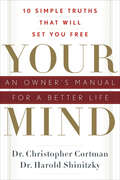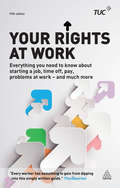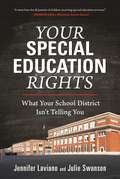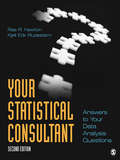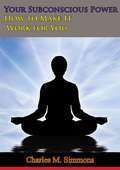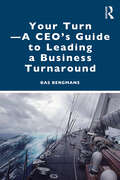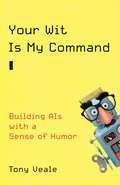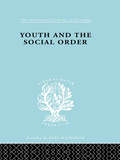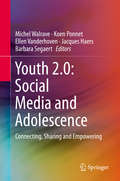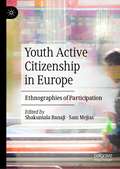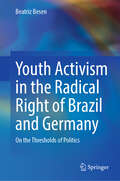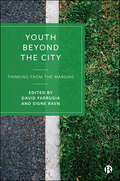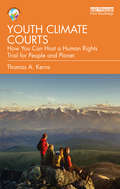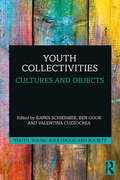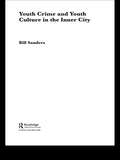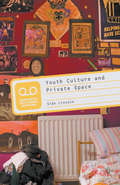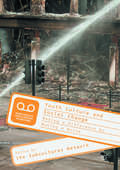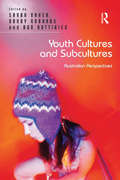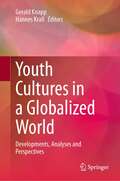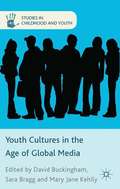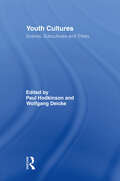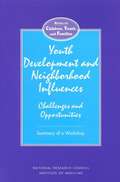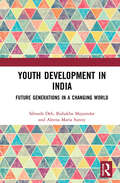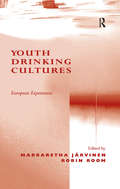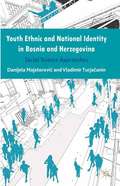- Table View
- List View
Your Mind: An Owner's Manual for a Better Life
by Dr. Christopher Cortman Harold ShinitzkyTen crucial psychological truths that provide “a clinical framework with concrete ways to tackle standing emotional issues” (Foreword Reviews).During tens of thousands of hours facilitating psychotherapy, Drs. Christopher Cortman and Harold Shinitzky came to realize that most people are unaware of ten crucial psychological truths—truths imperative to maintaining mental health and well-being. As a result of this lack of awareness, people become anxious, depressed, and generally unhappy; if they learn the ten truths, they are more likely to lead productive, fulfilled lives. Do you know that:Emotions are understandable and contain valuable information?Our behavior has a hidden purpose?We all have an internal saboteur whom we must identify and control?We can change how we act if we change how we think?Time heals nothing?Your Mind: An Owner’s Manual for a Better Life combines extensive psychological research with decades of clinical practice in a practical, easy-to-digest narrative. Through examples and exercises, Drs. Cortman and Shinitzky present a step-by-step strategy to help you make use of the truths and become a happier, healthier you.
Your Rights at Work: Everything You Need to Know About Starting a Job, Time off, Pay, Problems at Work - and Much More!
by Trades Union CongressYour Rights at Work is a comprehensive, jargon-free guide to the legal rights of the employee and the responsibilities of the employer. Accessible and reliable, it offers real solutions to the problems and issues that can face anyone at work. Using the law is always a last resort, but if you have to take that step, there is practical advice on that too. Topics covered include: starting a job; parental leave and maternity rights; flexible working; equality law; dismissal and redundancy; pay and holiday rights; grievance procedures and how to enforce your rights. Your Rights at Work is written by employment experts at the Trade Union Congress (TUC). As the people who campaigned for many of the rights set out in this book, there is no one better to explain how they should apply in your workplace and what to do if they don't.
Your Special Education Rights: What Your School District Isn't Telling You
by Jennifer Laviano Julie SwansonDrawing on decades of experience, Jennifer Laviano, a high-profile special education attorney, and Julie Swanson, a sought-after special education advocate, help parents of students with disabilities navigate their school systems to get the services they need for their children.Parents will find no other book on special education like Your Special Education Rights. Julie and Jennifer demystify the federal laws that govern the rights of public school children with disabilities and explain how school districts often ignore or circumvent these laws. They pull the curtain back on the politics of special education, exposing truths that school districts don’t want you to know, such as the fact that teachers are often under extraordinary pressure not to spend resources on services.Most importantly, they outline the central rights you and your child have regarding your child’s education. Did you know that you can refer your child for a special education evaluation? That you can ask for a second opinion if you disagree with the results of some or all of the testing? That you are entitled to parent counseling, training, and more?They also show you how to take that knowledge and apply it to advocating for your child. Here’s what you need to know about the paperwork you will have to complete, detailed information on how to advocate for your child and how to craft language in documents that benefit your child, and more.Filled with vital information and invaluable resources, Your Special Education Rights gives you the information you need to help your child succeed in school and beyond.
Your Statistical Consultant: Answers to Your Data Analysis Questions
by Dr Kjell Erik Rudestam Dr Rae R. NewtonAlthough many graduate students and researchers have had course work in statistics, they sometimes find themselves stumped in proceeding with a particular data analysis question. In fact, statistics is often taught as a lesson in mathematics as opposed to a strategy for answering questions about world[?], leaving beginning researchers at a loss for how to proceed. In these situations, it is common to turn to a statistical expert, the "go to" person when questions regarding appropriate data analysis emerge. Your Statistical Consultant is an authentic alternative resource for describing, explaining, and making recommendations regarding thorny or confusing statistical issues. Written to be responsive to a wide range of inquiries and levels of expertise, this book is flexibly organized so readers can either read it sequentially or turn directly to the sections that correspond to their concerns and questions.
Your Subconscious Power: How to Make It Work for You
by Charles M. SimmonsA step-by-step, day-by-day plan for gearing your everyday living to the powerful, life-shaping force within you…for lasting satisfaction and achievement!This book, which was first published in 1957, contains 10 Practice Projects that actually make you live with YOUR SUBCONSCIOUS POWER…that puts all its potential energies to work for you!“Charles M. Simmons has a unique place in the field of adult education. He has the ability to get people excited about their own possibilities without false stimulation—intoxication without alcohol! He is able to help them apply this enthusiasm and positive attitude for practical ends. He appeals to large groups of adults with high levels of intelligence and success. I can anticipate that his book—Your Subconscious Power—will be filled with his enthusiasm and wisdom. There’s never a dull moment with the Simmons approach!”—William B. McCoard, Ph.D., Professor of Speech, University of Southern California“Charles M. Simmons is making history. He will challenge you into action. His book helps focus action on fundamentals that get results. Its method is simple but powerful. Read the book carefully and things will happen! Read it and apply it—things will happen!”—Warren O. Wagner, Consulting Engineer, Pasadena, California
Your Turn —A CEO’s Guide to Leading a Business Turnaround
by Bas BergmansA groundbreaking exploration into the intricate art of business turnarounds and swift recovery – qualified by a career’s worth of insights – in Your Turn the message is startlingly clear: a turnaround is a one-chance-only experience. This is ‘do or die,’ and if you understand that in time and act accordingly by following a robust, comprehensive, data-driven approach to survival, your company stands a good chance of weathering the storm.Your Turn is a practical guide for executives to lead their own business turnarounds. With meticulous detail and respected leadership insights, the author has built a step-by-step approach that has served him well in delivering successful business turnarounds.Packed with real-world business examples and instructive models, Your Turn is an indispensable resource for CEOs, board members and senior leadership looking to drag their company out of a distressed situation and back into a thriving enterprise.
Your Wit Is My Command: Building AIs with a Sense of Humor
by Tony VealeFor fans of computers and comedy alike, an accessible and entertaining look into how we can use artificial intelligence to make smart machines funny.Most robots and smart devices are not known for their joke-telling abilities. And yet, as computer scientist Tony Veale explains in Your Wit Is My Command, machines are not inherently unfunny; they are just programmed that way. By examining the mechanisms of humor and jokes--how jokes actually works--Veale shows that computers can be built with a sense of humor, capable not only of producing a joke but also of appreciating one. Along the way, he explores the humor-generating capacities of fictional robots ranging from B-9 in Lost in Space to TARS in Interstellar, maps out possible scenarios for developing witty robots, and investigates such aspects of humor as puns, sarcasm, and offensiveness. In order for robots to be funny, Veale explains, we need to analyze humor computationally. Using artificial intelligence (AI), Veale shows that joke generation is a knowledge-based process--a sense of humor is blend of wit and wisdom. He notes that existing technologies can detect sarcasm in conversation, and explains how some jokes can be pre-scripted while others are generated algorithmically--all while making the technical aspects of AI accessible for the general reader. Of course, there's no single algorithm or technology that we can plug in to make our virtual assistants or GPS voice navigation funny, but Veale provides a computational roadmap for how we might get there.
Youth & Social Order Ils 149 (International Library of Sociology)
by Frank MusgroveFirst published in 1998. Routledge is an imprint of Taylor & Francis, an informa company.
Youth 2.0: Social Media and Adolescence
by Michel Walrave Koen Ponnet Ellen Vanderhoven Jacques Haers Barbara SegaertThis book grasps the duality between opportunities and risks which arise from children's and adolescents' social media use. It investigates the following main themes, from a multidisciplinary perspective: identity, privacy, risks and empowerment. Social media have become an integral part of young people's lives. While social media offer adolescents opportunities for identity and relational development, adolescents might also be confronted with some threats. The first part of this book deals with how young people use social media to express their developing identity. The second part revolves around the disclosure of personal information on social network sites, and concentrates on the tension between online self-disclosure and privacy. The final part deepens specific online risks young people are confronted with and suggests solutions by describing how children and adolescents can be empowered to cope with online risks. By emphasizing these different, but intertwined topics, this book provides a unique overview of research resulting from different academic disciplines such as Communication Studies, Education, Psychology and Law. The outstanding researchers that contribute to the different chapters apply relevant theories, report on topical research, discuss practical solutions and reveal important emerging issues that could lead future research agendas.
Youth Active Citizenship in Europe: Ethnographies of Participation
by Shakuntala Banaji Sam MejiasThis volume engages with the contested concept of ‘active citizenship’. It analyses the use and understanding of active citizenship in youth civic and political initiatives in the Czech Republic, Estonia, Germany, Italy, Portugal and the UK. Using ethnographic data and insights from the cross-European project CATCH-EyoU, the contributors to this collection illuminate the experiences of young people taking action for social change. It does so at a unique moment when a resurgent populist political right is deploying racial prejudice and neoliberal protectionism in both established media and new digital media to fuel xenophobic nationalism. The book asks a range of questions, including: What is life like for active young citizens with an interest in the civic and political spheres? What practices, relationships and motivations characterise their participatory movements, organisations, initiatives and groups? The chapters use case studies to analyse how friendship and emotion, social media, diversity-work, racism, precarity and burnout feed into motivating and developing or curtailing sustained pro-democratic activism.Youth Active Citizenship in Europe will be of interest to students and scholars across a range of disciplines including politics, sociology, education and cultural studies.
Youth Activism in the Radical Right of Brazil and Germany: On the Thresholds of Politics
by Beatriz BesenThis book offers a comprehensive analysis of radical right youth activism in Brazil and Germany, examining the complex pathways of political engagement through innovative biographical and narrative research. By exploring the tensions between democratic and anti-democratic practices, the study reveals how young activists navigate political landscapes, uncovering the intricate relationships between conservative discourses, neoliberalism, and political identity formation. Drawing on political psychology and post-structuralist approaches, the author challenges traditional interpretations of youth political participation. Combining in-depth interviews and comparative analysis, the book sheds light on the motivations, discourses, and mechanisms that have driven and sustained their engagement. By offering a comparative perspective, it reveals both the specific national dynamics and the transnational patterns that characterize radical right youth activism today. Youth Activism in the Radical Right of Brazil and Germany: On the Thresholds of Politics is essential for scholars of psychology, politics and sociology, as well as for students and policymakers seeking to understand the growing youth engagement in radical right-wing movements and its challenges for contemporary democracy.. The original manuscript of this book was written in Brazilian Portuguese and translated into English with the help of artificial intelligence. A subsequent human revision was done primarily in terms of content.
Youth Beyond the City: Thinking from the Margins
by David Farrugia and Signe RavnThis interdisciplinary collection charts the experiences of young people in places of spatial marginality around the world, dismantling the privileging of urban youth, urban locations and urban ways of life in youth studies and beyond. Expert authors investigate different dimensions of spatiality including citizenship, materiality and belonging, and develop new understandings of the complex relationships between place, history, politics and education. From Australia to India, Myanmar to Sweden, and the UK to Central America, international examples from both the Global South and North help to illuminate wider issues of intergenerational change, social mobility and identity. By exploring young lives beyond the city, this book establishes different ways of thinking from a position of spatial marginality.
Youth Climate Courts: How You Can Host a Human Rights Trial for People and Planet
by Thomas A. KernsThis book focuses on Youth Climate Courts, a bold new tool that young people in their teens and twenties can use to compel their local city or county government to live up to its human rights obligations, formally acknowledge the climate crisis, and take major steps to address it. Tom Kerns shows how youth climate leaders can form their own local Youth Climate Court, with youth judges, youth prosecuting attorneys, and youth jury members, and put their local city or county government on trial for not meeting its human rights obligations. Kerns describes how a Youth Climate Court works, how to start one, what human rights are, what they require of local governments, and what governmental changes a Youth Climate Court can realistically hope to accomplish. The book offers young activists a brand new, user-friendly, cost-free, barrier-free, powerful tool for forcing local governments to come to terms with their obligation to protect the rights of their citizens with respect to the climate crisis. This book offers a unique new tool to young climate activists hungry for genuinely effective ways to directly move governments to aggressively address the climate crisis.
Youth Collectivities: Cultures and Objects (Youth, Young Adulthood and Society)
by Bjørn SchiermerThis volume seeks to address what its contributors take to be an important lacuna in youth cultural research: a lack of interest in the phenomenon of collectivity and collective aspects of youth culture. It gathers scholars from diverse research backgrounds – ranging from contemporary subculture studies, fan culture studies, musicology, youth transitions studies, criminology, technology and work-life studies – who all address collective phenomena in young lives. Ranging thematically from music experience and festival participation, via soccer fan culture, leisure, street art, youth climate activism, to the design of EU youth policies and Australian government ‘project’ work with young migrants, the chapters develop a variety of approaches to collective aspects to young cultural practices and material cultures. To establish these new approaches, the contributors combine new theories and fresh empirical work; they critically engage with the tradition and they complement or even reconfigure traditional approaches in and around the field. The book will be of interest to researchers in a broad range of areas in and around the field of youth culture studies including post-subculture studies, cultural studies, musicology, fan-culture and youth transition research, but it is also of acute interest for theoretically interested sociologists. The volume offers a new afterword by French sociologist Michel Maffesoli.
Youth Crime and Youth Culture in the Inner City (Routledge Advances in Sociology)
by Bill SandersYouth Crime and Youth Culture in the Inner City offers an interpretive account of juvenile delinquency within the modern inner city, an environment which is characterized by a long history of social deprivation and high rates of crime. A wide range of topics are explored, such as young people's motivation for, frequency of, and attitudes towards, a variety of illegal behaviors, such as street robbery, burglary, theft, drug use, drug selling and violence. Why do young people commit these offences? Who do they commit them against? How do they feel afterwards? This book attempts to answer these important theoretical questions, utilizing ethnographic research collected over a seven year period and based around the London inner city borough of Lambeth.
Youth Culture and Private Space
by S. LincolnSiân Lincoln considers the use, role and significance of private spaces in the lives of young people. Drawing on extensive ethnographic research, she explores the place of 'the private' in youth cultural discourses, both historically and contemporarily, that until now have remained largely absent in youth cultural research.
Youth Culture and Social Change
by John Street Peter Webb Lucy Robinson Matthew Worley Keith Gildart Anna Gough-Yates Sian Lincoln Bill OsgerbyThis book brings together historians, sociologists and social scientists to examine aspects of youth culture. The book's themes are riots, music and gangs, connecting spectacular expression of youthful disaffection with everyday practices. By so doing, Youth Culture and Social Change maps out new ways of historicizing responses to economic and social change: public unrest and popular culture.
Youth Cultures and Subcultures: Australian Perspectives
by Brady Robards Sarah BakerThis volume critically examines ’subculture’ in a variety of Australian contexts, exploring the ways in which the terrain of youth cultures and subcultures has changed over the past two decades and considering whether ’subculture’ still works as a viable conceptual framework for studying youth culture. Richly illustrated with concrete case studies, the book is thematically organised into four sections addressing i) theoretical concerns and global debates over the continued usefulness of subculture as a concept; ii) the important place of ’belonging’ in subcultural experience and the ways in which belonging is played out across an array of youth cultures; iii) the gendered experiences of young men and women and their ways of navigating subcultural participation; and iv) the ethical and methodological considerations that arise in relation to researching and teaching youth culture and subculture. Bringing together the latest interdisciplinary research to combine theoretical considerations with recent empirical studies of subcultural experience, Youth Cultures and Subcultures will appeal to scholars and students across the social sciences.
Youth Cultures in a Globalized World: Developments, Analyses and Perspectives
by Hannes Krall Gerald KnappThis book examines the relation between the phenomenon of globalization, changes in the lifeworld of young people and the development of specific youth cultures. It explores the social, political, economic and cultural impact of globalization on young people. Growing diversity in their lifeworlds, technological development, migration and the ubiquity of digital communication and representation of the world open up new forms of self-representation, networking and political expression, which are described and discussed in the book. Other topics are the impact of globalization on work and economy, global environmental issues such as climate change, political movements which put “nationalism first”, change of youth`s values and the significance of body, gender and beauty. The book highlights the challenges of young people in modern life, as well as the way in which they express themselves and engage in society – in culture, politics, work and social life.
Youth Cultures in the Age of Global Media
by David Buckingham Mary Jane Kehily Sara BraggThis book explores the impact of globalisation and new technologies on youth cultures around the world, from the Birmingham School to the youthscapes of South Korea. In a timely reappraisal of youth cultures in contemporary times, this collection profiles the best of new research in youth studies written by leading scholars in the field.
Youth Cultures: Scenes, Subcultures and Tribes (Routledge Advances in Sociology #10)
by Paul Hodkinson Wolfgang DeickeYouth Cultures offers a comprehensive outline of youth cultural studies in the twenty-first century, with reference to a range of new research case studies. Featuring both well known and emerging scholars from the UK, the US and mainland Europe, the book addresses core theoretical and methodological developments before going on to examine key substantive themes in the study of young people's identities and lifestyles. These include questions of commerce, power and politics, issues of gender and ethnicity, uses of place and space and impacts of new media and communications. Simultaneously offering an accessible introduction and a range of new contributions to the subject area, Youth Cultures will appeal to both students and academics within a range of disciplines, including sociology, media and cultural studies, youth studies and popular music studies.
Youth Development and Neighborhood Influences: Challenges and Opportunities Summary of a Workshop
by Committee on Youth DevelopmentA report on Youth Development and Neighborhood Influences
Youth Development in India: Future Generations in a Changing World
by Sibnath Deb Aleena Maria Sunny Bishakha MajumdarThis book provides a comprehensive understanding of youth development and protection in the Indian context. It reviews the demographic and socio-economic background and future prospects of Indian youth. The book discusses the role of family and culture in the upbringing and development of youth, changing political and socio-economic situations, and the influence of parents and teachers in shaping the future of the youth. The book highlights the nature of adversities faced by children and youth and the subsequent impact on their mental health and well-being. It also examines the efficacy of various skill development programmes and national and international policies designed for the youth. The book will be of interest to students, teachers, and researchers of population sciences, population studies, psychology, childhood studies, development studies, sociology, and youth studies. It will also be of interest to policymakers and NGOs working with children and youth.
Youth Drinking Cultures: European Experiences
by Margaretha Järvinen Robin RoomHow can 'binge drinking' be explained and understood? Is alcohol consumption related to the particular cultural characteristics of some European countries? Should heavy drinking cultures be seen as a mainstream youth phenomenon or as marginal - and is this different in different countries? A team of leading researchers addresses these questions and more in their analysis of the alcohol consumption patterns of European young people. Alcohol consumption is an important marker of transition from childhood to early adulthood, yet the timing, intensity and purpose of adolescent drinking varies dramatically between countries. The contributors provide cross-national comparisons to investigate how drinking behaviour varies, examining factors such as gender, societal context and family socio-economic backgrounds. Youth Drinking Cultures offers a comprehensive set of perspectives on adolescent drinking in Europe. In linking issues around social identity and the life-course with a highly topical area of media and policy concern, the book will be of great value to sociology and social policy scholars, especially youth researchers, and also to professionals working with young people.
Youth Ethnic and National Identity in Bosnia and Herzegovina
by Danijela Majstorovic Vladimir TurjacaninYouth Ethnic and National Identity in Bosnia and Herzegovina is an interdisciplinary effort to position and describe the contested nature of state and ethnic identity among youth in Bosnia and Herzegovina by providing empirical, first-hand evidence on identity structure and the subsequent implications for inter-group relations.
